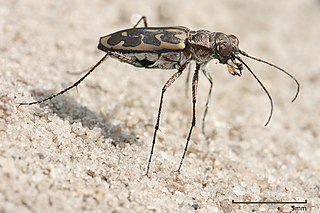
Tiger beetles are a family of beetles, Cicindelidae, known for their aggressive predatory habits and running speed. The fastest known species of tiger beetle, Rivacindela hudsoni, can run at a speed of 9 km/h, or about 125 body lengths per second. As of 2005, about 2,600 species and subspecies were known, with the richest diversity in the Oriental (Indo-Malayan) region, followed by the Neotropics. While historically treated as a subfamily of ground beetles (Carabidae) under the name Cicindelinae, several studies since 2020 indicated that they should be treated as a family, the Cicindelidae, which are a sister group to Carabidae within the Adephaga.

Ant nest beetles or paussines, some members of which are known also as flanged bombardier beetles, are a large subfamily within the ground beetles (Carabidae).The tribes Metriini, Ozaenini, Paussini and Protopaussini are included in the subfamily.

Cyclommatus is a genus of the family Lucanidae, also known as the stag beetle. The majority of the species from the genus Cyclommatus are located in Southeast Asia, though some species are found in China and Taiwan as well. The genus Cyclommatus also consists of three subgenera: Cyclommatus, Cyclommatinus and Cyclommatellus. Each subgenera contains 80, 24 and 3 species respectively. In total, the genus Cyclommatus consists of a total of 134 species, though more are still being discovered to this day.
Carabidomemnus is a genus in the beetle family Carabidae. There are more than 20 described species in Carabidomemnus.
Eohomopterus is a genus in the beetle family Carabidae. There are about five described species in Eohomopterus.

Cerapterus is a genus in the beetle family Carabidae. There are more than 30 described species in Cerapterus.

Heteropaussus is a genus of beetles in the family Carabidae, containing the following species:
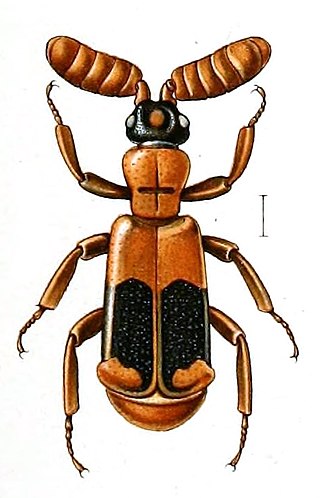
Ceratoderus is a genus in the beetle family Carabidae. There are about 11 described species in Ceratoderus.

Lebioderus is a genus in the beetle family Carabidae. There are about 11 described species in Lebioderus.
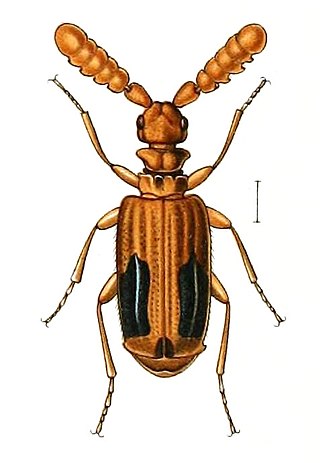
Melanospilus is a genus of flanged-bombardier beetles or paussines in the family Carabidae, containing the following species: The genus is considered to belong to the subtribe Ceratoderina and all members are thought to be myrmecophiles. The ant host Paratrechina longicornis is known for M. bensoni.

Trigonotoma is a genus in the beetle family Carabidae. There are more than 50 described species in Trigonotoma.

Paussini is a tribe of ground beetles in the family Carabidae. There are more than 25 genera and 610 described species in Paussini. They are found mainly in Africa, southern Asia, and the Pacific, although the genus Homopterus is found in the Americas.

Macrocoma is a genus of leaf beetles in the subfamily Eumolpinae. It contains about 100 species, which are found in tropical Africa, around the Mediterranean, on the Canary Islands, in western and central Asia, and in India.
Dinardilla is a genus of rove beetles in the family Staphylinidae. There are at least two described species in Dinardilla.
Basilepta is a genus of leaf beetles in the subfamily Eumolpinae. It is generally distributed in Asia. A single species is also known from central Africa.
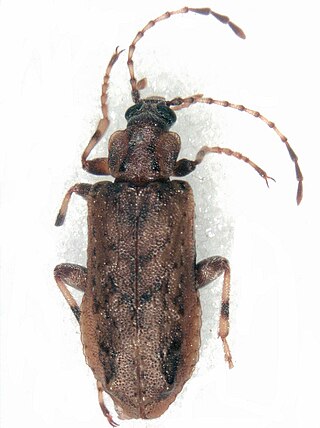
Promecheilidae is a family of beetles in the superfamily Tenebrionoidea. Perimylopidae is considered a synonym. They are found in southern South America and associated archipelagos like South Georgia and the Falklands, New Zealand and Tasmania. Some species are associated tree ferns and moss-covered dead wood, and other forested habitats, while others are associated with peat bogs, grasslands and coastal habitats. They are probably phytophagus, feeding on lichen, moss, and other plant material.
Nodina is a genus of leaf beetles in the subfamily Eumolpinae. It is distributed in Asia.
Trypeticus is a genus of beetles belonging to the family Histeridae.
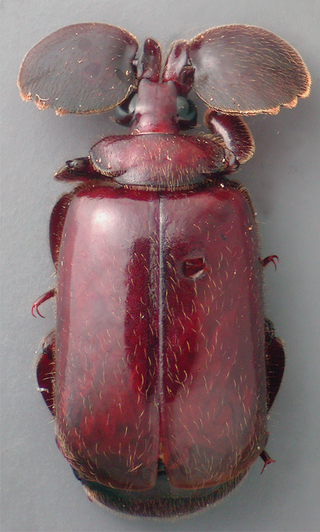
Platyrhopalopsis melleii is a species of ant-nest or flanged bombardier beetle found in southern India. They live inside the nests of ants of the genus Carebara and adults are only rarely seen in the open, most often at night when they get attracted to lights.












